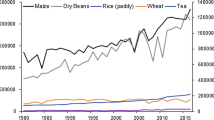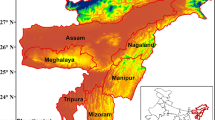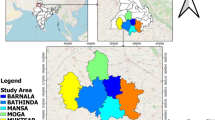Abstract
The purpose of this research is to investigate that the irrigation facilities, watershed development programs, and land use land cover (LULC) changes within the Bhogavo River watershed (BRW) in India have any impact on the regional-scale changes in the extreme temperature. In the present study, an investigation has been made to study the spatial and temporal trend assessment in the maximum, and the minimum temperature in BRW, in western India on an annual and monthly time scale; from 1979 to 2014, i.e., for available data span. The Mann–Kendall test with Sen’s slope estimator and linear regression methods are applied for trend detection and evaluation in extreme temperature. The annual minimum and maximum air temperature have shown non-significant trend (at 5%) rate at 0.0372 °C/year, and—0.0278 °C/year over 1979 to 2014, respectively, in the study area. It is recognized that the region with a growing area of cropland due to irrigation and water management facilities over the data span resulted in the negative trend/cooling in the maximum temperature within the study area. The minimum temperature trend in the rainy season portraits a low value comparative to other months. It is revealed that due to watershed management program implemented, and irrigation facilities created in the study area, the cropland, forest cover, surface cover of water bodies has been proliferated. Associating the spatial distribution of the extreme temperature trends to the LULC classification and their changes, it is established that increasing cropland and forest cover, and water bodies developed in the study area over a time horizon have shown tendencies of low/negative trend value in maximum temperature in the study area, and thus mitigate the changes due to climate. However, minimum temperature continues to follow non-significant positive trend. This study implies that the watershed development practices, sustainable water resources management, and proliferation of forest cover mitigate the global impact of climate change at regional scale. Thus, the watershed development program and sustainable water management practices at the regional and watershed scale should be promoted for adaptation and mitigation of climate change impacts.
Similar content being viewed by others
Data availability
Data were obtained from Climate Forecast System Reanalysis (CFSR), USA (https://globalweather.tamu.edu), and also from Indian Meteorological Department of India.
References
Asfaw A, Simane B, Hassen A, Bantider A (2018) Variability and time series trend analysis of rainfall and temperature in northcentral Ethiopia: a case study in Woleka sub-basin. Weather Climate Extrem 19:29–41. https://doi.org/10.1016/j.wace.2017.12.002
Celine BC, Lobell D (2007) Empirical evidence for a recent slowdown in irrigation-induced cooling. Proc Natl Acad Sci U S A 104(34):13582–13587. https://doi.org/10.1073/pnas.0700144104
CGWB Central Ground Water Board (2022) http://cgwb.gov.in/District_Profile/Gujarat/Surendarnadar.pdf (Accessed on 30th Sept 2022)
Chandole V, Joshi GS, Rana SC (2019) Spatio -temporal trend detection of hydro -meteorological parameters for climate change assessment in Lower Tapi river basin of Gujarat state, India. J Atmos Solar Terr Phys 195:105130. https://doi.org/10.1016/j.jastp.2019.105130
Cui L, Wang L, Lai Z, Tian Q, Liu W, Li J (2017) Innovative trend analysis of annual and seasonal air temperature and rainfall in the Yangtze River Basin, China during 1960–2015. J Atmos Solar Terr Phys 164:48–59. https://doi.org/10.1016/j.jastp.2017.08.001
Devi S, Purohit RC, Bhakar SR, Lakhawat SS (2017) Spatial and temporal trends of precipitation and temperature for the MPUAT service area, Rajasthan, India. IOSR JAVS 10(07):15–20. https://doi.org/10.9790/2380-1007011520
Dile YT, Srinivasan R (2014) Evaluation of CFSR climate data for hydrologic prediction in data-scarce watersheds: an application in the Blue Nile River Basin. J Am Water Resour Assoc 50(5):1226–1241. https://doi.org/10.1111/jawr.12182
Fuka DR, Walter MT, MacAlister C, Degaetano AT, Steenhuis TS, Easton ZM (2014) Using the Climate Forecast System Reanalysis as weather input data for watershed models. Hydrol Process 28(22):5613–5623. https://doi.org/10.1002/hyp.10073
Gadgil A, Dhorde A (2005) Temperature trends in twentieth century at Pune, India. Atmos Environ 39(35):6550–6556. https://doi.org/10.1016/j.atmosenv.2005.07.032
Gedefaw M, Wang H, Yan D, Song X, Yan D, Dong G, Wang J, Girma A, Ali B, Batsuren D, Abiyu A, Qin T (2018) Trend analysis of climatic and hydrological variables in the Awash River Basin, Ethiopia. Water 10(11):1554. https://doi.org/10.3390/w10111554
GNWRS Gujarat Narmada, Water Resources (1974) Water supply and Kalpasar Department: https://guj-nwrws.gujarat.gov.in/showpage.aspx?contentid=1974&lang=English)
Gocic M, Trajkovic S (2013) Analysis of changes in meteorological variables using Mann-Kendall and Sen’s slope estimator statistical tests in Serbia. Global Planet Change 100:172–182. https://doi.org/10.1016/j.gloplacha.2012.10.014
https://globalweather.tamu.edu (Accessed on 11th June 2019)
https://swhydrology.gujarat.gov.in/meteorology Accessed on 5th May 2021
Indian Environmental Portal (2018) http://www.indiaenvironmentportal.org.in/content/201041/gujarat-watershed-development/ (Accessed on 2nd February 2018)
IPCC (2014) Climate Change 2014: Synthesis Report. Contribution of Working Groups I, II and III to the Fifth Assessment Report of the Intergovernmental Panel on Climate Change. IPCC, Geneva, Switzerland, 151 pp
IWRIS India Water Resources Information System (2022) www.indiawris.gov.in (Accessed on 30th Sept 2022)
Jeganathan A, Andimuthu R (2013) Temperature trends of Chennai City, India. Theor Appl Climatol 111(3–4):417–425. https://doi.org/10.1007/s00704-012-0646-6
Jeganathan A, Andimuthu R, Kandasamy P (2019) Trends of the observed temperature and its variations in the Tamil Nadu State of India. Theor Appl Climatol 137(1–2):103–116. https://doi.org/10.1007/s00704-018-2582-6
Jin Z, Guo L, Fan B, Lin H, Yu Y, Zheng H, Chu G, Zhang J, Hopkins I (2019) Effects of afforestation on soil and ambient air temperature in a pair of catchments on the Chinese Loess Plateau. CATENA 175:356–366. https://doi.org/10.1016/j.catena.2018.12.036
Joshi GS, Makhasana P (2020) Assessment of seasonal climate transference and regional influential linkages to land cover – Investigation in a river basin. J Atmos Solar Terr Phys 199:105209. https://doi.org/10.1016/j.jastp.2020.105209
Joshi GS, Makhasana P (2021) Spatio-temporal trend detection of rainfall for climate change assessment in Ahmedabad-Gandhinagar District of Gujarat State, India. J Clim Chang 7(1):69–78. https://doi.org/10.3233/JCC210006
Li H, Liu L, Shan B, Xu Z, Niu Q, Cheng L, Liu X, Xu Z (2019) Spatiotemporal variation of drought and associated multi-scale response to climate change over the Yarlung Zangbo River Basin of Qinghai-Tibet Plateau, China. Remote Sens 11(13):1596. https://doi.org/10.3390/rs11131596
Liu Z, Yang M, Wan G, Wang X (2017) The spatial and temporal variation of temperature in the Qinghai-Xizang (Tibetan) plateau during 1971–2015. Atmosphere 8(12):214. https://doi.org/10.3390/atmos8110214
Lobell DB, Bonfils C (2008) The effect of irrigation on regional temperatures: a spatial and temporal analysis of trends in California, 1934–2002. J Clim 21(10):2063–2071. https://doi.org/10.1175/2007JCLI1755.1
Mann HB (1945) Nonparametric tests against trend. Econometrica 13:245–259
Mohsin T, Gough WA (2010) Trend analysis of long-term temperature time series in the Greater Toronto Area (GTA). Theor Appl Climatol 101(3–4):311–327. https://doi.org/10.1007/s00704-009-0214-x
Motiee H, McBean E (2009) An assessment of long-term trends in hydrologic components and implications for water levels in Lake Superior. Hydrol Res 40(6):564–579. https://doi.org/10.2166/nh.2009.061
NIC National Informatics Centre (2018) https://surendranagar.nic.in/about-district/ (Accessed on 3rd March 2018)
Pal I, Al-Tabbaa A (2010) Long-term changes and variability of monthly extreme temperatures in India. Theor Appl Climatol 100(1–2):45–56. https://doi.org/10.1007/s00704-009-0167-0
Panda A, Sahu N (2019) Trend analysis of seasonal rainfall and temperature pattern in Kalahandi, Bolangir and Koraput district of Odisha, India. Atmos Sci Lett. https://doi.org/10.1002/asl.932
Patel VR, Patel BM, Patel RP (2012) Gujarat- A Leading state in watershed development - A review. An international E J 1(3) 221–243. (http://arkgroup.arkgroup.co.in/upload/Article/9441.%20GUJARAT-%20%20A%20%20LEADING%20STATE%20IN%20WATERSHED%20DEVELOPMENT-%20A%20REVIEW%20%20PATEL,V.R..pdf;%20%20PATEL,%20B.M.%20%20AND%20%20%20PAVAYA,%20R.P..pdf.)
Pingale SM, Khare D, Jat MK, Adamowski J (2014) Spatial and temporal trends of mean and extreme rainfall and temperature for the 33 urban centers of the arid and semi-arid state of Rajasthan, India. Atmos Res 138:73–90. https://doi.org/10.1016/j.atmosres.2013.10.024
Rathore LS, Attri SD, Jaiswal AK (2013) State Level Climate Change Trends in India; India Meteorological Department. Ministry of Earth Sciences, Government of India, and Meteorological Monograph No. ESSO/IMD/EMRC/02/2013. (Accessed 6 June 2019)
Rauf AU, Rafi MS, Ali I, Muhammad UW (2016) Temperature trend detection in upper indus basin by using Mann-Kendall test. Adv Sci Technol Eng Syst J 1(4) 5–13. https://doi.org/10.25046/aj010402
Ross RS, Krishnamurti TN, Pattnaik S, Pai DS (2018) Decadal surface temperature trends in India based on a new high-resolution data set. Sci Rep 8(1):7452. https://doi.org/10.1038/s41598-018-25347-2
Roy SS, Mahmood R, Niyogi D, Lei M, Foster SA, Hubbard KG, Douglas E, Pielke R (2007) Impacts of the agricultural Green Revolution–induced land use changes on air temperatures in India. J Geophys Res. https://doi.org/10.1029/2007JD008834
Saboohi R, Soltani S, Khodagholi M (2012) Trend analysis of temperature parameters in Iran. Theor Appl Climatol 109(3–4):529–547. https://doi.org/10.1007/s00704-012-0590-5
Safari B (2012) Trend analysis of the mean annual temperature in Rwanda during the last fifty two years. JEP 03(06):538–551. https://doi.org/10.4236/jep.2012.36065
Sanikhani H, Kisi O, Mirabbasi R, Meshram SG (2018) Trend analysis of rainfall pattern over the Central India during 1901–2010. Arab J Geosci. https://doi.org/10.1007/s12517-018-3800-3
Sen PK (1968) Estimates of the regression coefficient based on Kendall’s tau. J Ame Stat Assoc 63:1379–1389
Shah AA (2001) Who Benefits from Participatory Watershed Development? Lessons from Gujarat, India. International Institute of Environment for Environment and Development (https://www.jstor.org/stable/pdf/resrep01336.pdf?refreqid=excelsior%3A8a21a82b89ee4d143f0f9c22b86c2b28&ab_segments=&origin=&acceptTC=1)
Shen W, Li M, Huang C, Hed T, Taoe X, Weif A (2019) Local land surface tem-perature change induced by afforestation based on satellite observations in Guangdong plantation forests in China. Agric for Meteorol 10764:276–277
SSNNL Sardar Sarovar Narmada Nigam Limited (2019) https://sardarsarovardam.org/fileman/Uploads/1.Map%20SBC.pdf (Accessed on 3rd March 2019)
Strandberg G, Kjellström E (2018) Climate impacts from afforestation and deforestation in Europe. Earth Interact. https://doi.org/10.1175/EI-D-17-0033.1
Tabari H, Marofi S, Aeini A, Talaee PH, Mohammadi K (2011) Trend analysis of reference evapotranspiration in the western half of Iran. Agric for Meteorol 151(2):128–136. https://doi.org/10.1016/j.agrformet.2010.09.009
USEPA United states Environment Protection Agency Report (2017) https://19january2017snapshot.epa.gov/climate-impacts/climate-impacts-human-health_.html
Zarenistanak M, Dhorde AG, Kripalani RH (2014) Trend analysis and change point detection of annual and seasonal precipitation and temperature series over southwest Iran. J Earth Syst Sci 123(2):281–295. https://doi.org/10.1007/s12040-013-0395-7
Zhao J, Huang Q, Chang J, Liu D, Huang S, Shi X (2015) Analysis of temporal and spatial trends of hydro-climatic variables in the Wei River Basin. Environ Res 139:55–64. https://doi.org/10.1016/j.envres.2014.12.028
Acknowledgements
Authors are thankful to the Department of Climate change and Department of Higher education of the state Government of Gujarat of India for providing the funds for the climate change project under the principal investigatorship of Dr. Geeta S. Joshi (Grant No. PRJ 10-2017168640118).
Author information
Authors and Affiliations
Contributions
All authors have contributed for preparation of this research paper.
Corresponding author
Ethics declarations
Conflict of interest
Authors declare that there is no conflict of interest among authors.
Additional information
Publisher's Note
Springer Nature remains neutral with regard to jurisdictional claims in published maps and institutional affiliations.
Rights and permissions
Springer Nature or its licensor (e.g. a society or other partner) holds exclusive rights to this article under a publishing agreement with the author(s) or other rightsholder(s); author self-archiving of the accepted manuscript version of this article is solely governed by the terms of such publishing agreement and applicable law.
About this article
Cite this article
Joshi, G.S., Chandole, V., Patel, P. et al. Spatio-temporal trend assessment of extreme temperatures and association with land use dynamics and water resource management practices in Bhogavo River watersheds, Gujarat, India. Sustain. Water Resour. Manag. 9, 63 (2023). https://doi.org/10.1007/s40899-023-00838-x
Received:
Accepted:
Published:
DOI: https://doi.org/10.1007/s40899-023-00838-x














